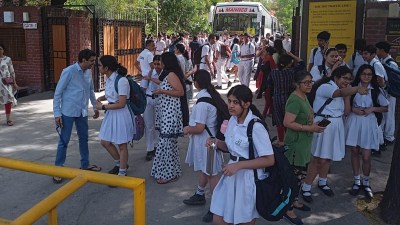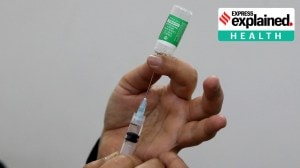- India
- International
Parents blind to wards vision defect
Researchers at the Armed Forces Medical College have recorded a significantly high prevalence of eye disorders among students in three Pune Cantonment Board schools.
Researchers at the Armed Forces Medical College (AFMC) have recorded a significantly high prevalence of eye disorders among students in three Pune Cantonment Board (PCB) schools.
What makes it worse is the apparent lack of concern among parents of the children with defective vision who did not seek any medical intervention though they were aware that it would be detrimental to the scholastic abilities of the child.
A study coordinated by Col A Datta and Col R Bhalwar and others from AFMC,also published in the January 9 issue of the Medical Journal of Armed Forces of India (MJAFI),shows the magnitude of the visual acuity disorders among children in the cantonment schools.
The earliest signs of disorders of visual acuity are strain of the eyes with redness,watering and headache at the end of school timings. Though the child may report his problems to his parents,there is a lack of awareness of the need for early and prompt correction of such disorders.
A total of 2,747 children,studying in 56 sections of Class V to X in three cantonment schools,were involved in the study and a sample size was eventually worked out to a minimum of 236 children. Fifty children were found to have errors of refraction resulting in a prevalence rate of 21.19 per cent.

A questionnaire-based study of the knowledge and attitude of the parents of 50 affected children was also conducted.
According to Col A Datta and Col R Bhalwar,the study highlighted the apparent lack of concern among the parents of children with refractory errors who failed to respond to the questionnaire.
The responses brought out that 18 parents were already aware that their child had a defective vision and a similar number knew that such a defect was detrimental to the scholastic activities of their child. Yet only 10 parents indicated that they would be taking their child to the eye clinic for necessary corrective action.
They felt it must be the procurement cost of spectacles that is inhibiting the parents from initiating action to provide correction of the refractory errors.
It is estimated that 2.3 billion people worldwide suffer from refractive errors. The vast majority of these could have their sight restored by spectacles,but only 1.8 billion people have access to eye examinations and affordable correction,says Col R Bhalwar,head,Department of Community Medicine,AFMC.
Around 500 million people,mostly in developing countries and mainly children,have impaired vision due to uncorrected errors that cause blindness,he says.
Blind spot
* 236 students examined in the AFMC study. None of them were using spectacles.
* 50 children were found having visual acuity disorders. Other problems detected were squint and corneal opacity.
* 10 parents indicated that they will be seeking corrective action.
Click here to join Express Pune WhatsApp channel and get a curated list of our stories
May 01: Latest News
- 01
- 02
- 03
- 04
- 05







































